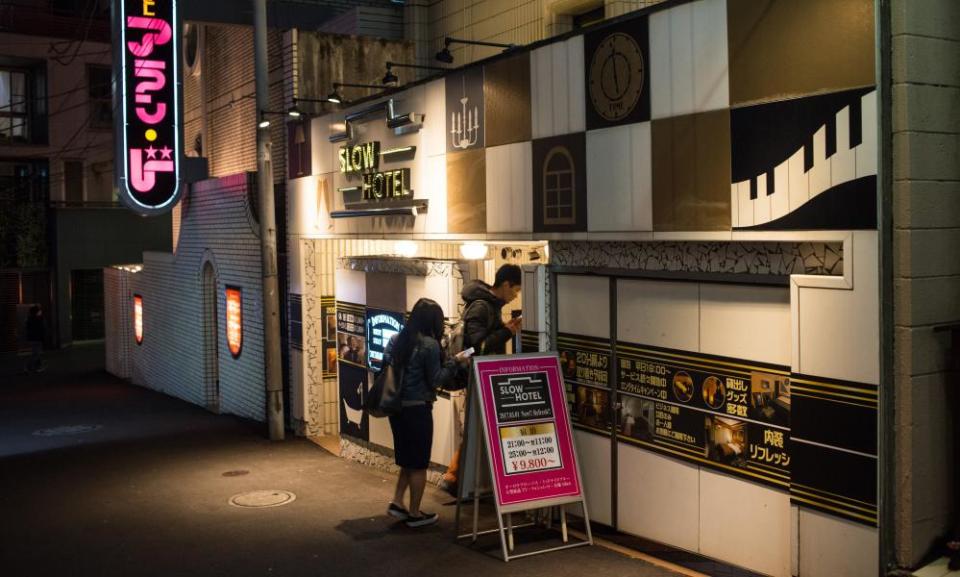Japan's 'love hotels' accused of anti-gay discrimination

In May this year, at the height of the coronavirus’s first wave, two gay men living together in Amagasaki, western Japan, thought they would ease the boredom of the country’s soft lockdown with a visit to a love hotel, where couples pay for short stays to have sex.
But rather than the carefree time they had anticipated, the couple, in their mid-30s, did not even get as far as the door to their room.
“The receptionist was very polite,” one of the men told the Kobe Shimbun. “He just said men aren’t allowed.” An attempt to find a room at another love hotel nearby also ended in disappointment. But this time the language was overtly homophobic.
“Gay men don’t use the facilities properly,” the female receptionist reportedly told them, without explanation. “It was a clear case of discrimination,” the man, who has not been named, told the newspaper. “We were being treated like second-class citizens.”
He and his partner, who are in a civil partnership recognised by the local government, are not alone. While Japan’s thousands of love hotels welcome millions of heterosexual couples in search of the privacy and intimacy denied them at home, gay couples say they are routinely turned away.
Despite rising awareness of LGBT rights, Japan is the only G7 country that does not recognise same-sex marriages, and much of the country’s multibillion-dollar love hotel industry accepts only heterosexual couples.
Taiga Ishikawa, Japan’s first openly gay MP, estimated that of 143 love hotels in Tokyo’s Toshima ward, where he began his career as an assembly member, 30 refused entry to same-sex couples.
The expectation that they will be rejected means many gay men have come to regard love hotels as off-limits, according to one member of Tokyo’s LGBT community, who told the Guardian: “Nothing dampens the prospect of a romantic evening out more than a homophobic hotel policy.”
Akira Nishiyama, assistant executive director of the Japan Alliance for LGBT Legislation, said hotel rejections of same-sex couples were common, even though it is illegal under a 2018 revision to the hotel business law, which states that hotels “should not reject guests on the basis of their sexual orientation or gender identity”.
On the rare occasions that customers report a hotel for homophobia, authorities simply offer the proprietors “administrative guidance” – a measure campaigners say lacks legal clout.
Modern love hotels, so named after the first of their kind – Hotel Love – opened in Osaka in the late 1960s, originally catered to couples desperate to escape their extended families, who traditionally lived under one roof, for a few hours of intimacy.
But a decline in the young population, the rise in single households, and the pre-pandemic boost in international tourism have prompted many to undergo image makeovers to appeal to travellers, including single guests looking for comparatively cheap and comfortable accommodation.
As a result, the number of hotels with an overtly sexual theme has dwindled to less than 10,000 in recent years, compared with around 30,000 two decades ago. Still, every day an estimated 1.4 million Japanese people visit a love hotel, and analysts believe the industry generates between ¥2-3tn (£14.8bn-£22.2bn) a year.
Gon Matsunaka, founder and president of Pride House Tokyo, which opened this month, believes most hotels will continue to ignore the law. “They often get away with discrimination as they don’t give an explicit reason for denying rooms to same-sex couples,” he said. “They make excuses, like claiming there are no rooms available.
“We could have people coming from all over the world to next year’s Olympics, and if gay couples are denied entry to love hotels it will not reflect well on Japan.”
Although some websites have started listing “gay-friendly” love hotels, Matsunaka said Japan’s refusal to fully accept the LGBT community, exemplified by the ban on same-sex marriages, made homophobia socially acceptable.
“There are a few love hotels that accept same-sex couples, like in the ni-chome gay district of Tokyo, but it’s very limited,” he said. “There is no pressure on the industry to change its ways.”
Japan has not passed an LGBT equality act, and a survey published this week found that 79% of LGBT respondents said they had heard discriminatory remarks about sexual minorities at work or school, although a large proportion – 67% – said social attitudes towards diversity of sexual orientation and gender identity had improved over the past five years.
Only this month, Masateru Shiraishi, a conservative assemblyman in Adachi ward in Tokyo, was forced to apologise after saying the neighbourhood would be “wiped out” by depopulation if the rights of sexual minorities were protected by law.
The lack of legal protection for sexual minorities makes it “really difficult” for many LGBT people to come out, said Nishiyama. “Places like love hotels where LGBTQ+ people can be guaranteed privacy are really important. They make it possible for them to be who they are, and to be with their partner, without fear.”
The two hotels in Amagasaki were reprimanded after the man lodged a complaint, prompting officials to order them to stop discriminating against same-sex guests. Last month the city’s assembly said it planned to drop “opposite sex” from a local ordinance definition of love hotel clientele.
“This is a great decision,” said Nishiyama. “A change in attitude among government organisations so they no longer exclude same-sex couples from love hotels will enable people to use them in safety. And it will raise awareness among hotel staff.”

